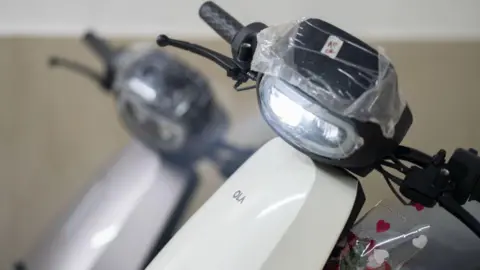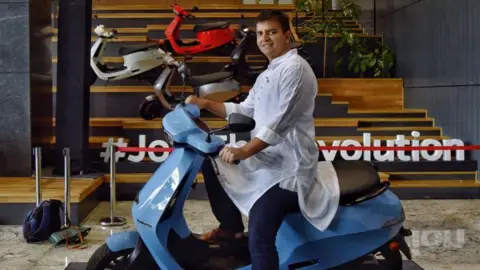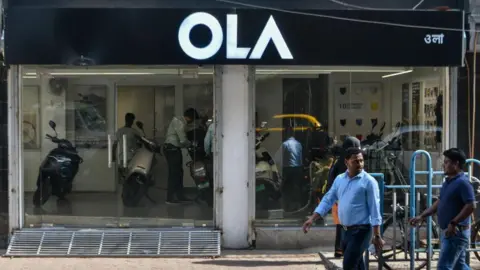 Getty Images
Getty ImagesIt was once the Indian start-up world’s shining star, but Ola is now battling a multitude of crises.
Founded in 2010, it quickly became a household name, expanding from ride-hailing to electric vehicles and battery cells, challenging Uber along the way.
The company jumped on the AI bandwagon in 2023 with Krutrim, India’s first AI company valued at over $1bn.
Marquee global investors such as Japan’s SoftBank, US-based Tiger Global and Singapore’s Temasek bankrolled this expansion. Last year, Ola’s electric vehicles (EV) arm raised close to $734m (£567m) in a blockbuster initial public offering (IPO), India’s biggest in 2024.
But this ambitious rise has been accompanied by a series of controversies lately, particularly at its EV arm.
Ola Electric has lost close to 70% of its value in the seven months since the IPO was launched. It is facing competition from more established two-wheeler giants, along with mounting regulatory scrutiny.
Sales of Ola’s scooters are down to less than half from April last year and the company’s losses have widened. Customers have posted videos on social media of Ola scooters going up in flames or breaking down mid-ride.
There’s a government inquiry under way at hundreds of newly-opened Ola showrooms regarding licences and registrations. One of its vendors also filed an insolvency plea against the company, which Ola said in a statement to stock exchanges that it had settled.
The BBC has learnt from former employees and industry sources that delayed payments have led to many major suppliers and logistics partners ending ties with them.
Ola has been cutting jobs, restructuring operations and automating functions in a bid to reduce costs and trim losses. Media reports say it has undertaken a second round of layoffs since November, with over 1,000 roles axed.
The BBC sent detailed questions to Ola about these issues. The company shared links to some of its earlier press statements, not responding specifically to all the queries.
So, what’s gone wrong?
 Getty Images
Getty ImagesOla CEO Bhavish Aggarwal positioned the company as Tesla’s two-wheeler equivalent, solving the emissions problem for the price-sensitive Indian market.
He poured in millions of marketing dollars, opening Ola showrooms across India, even delivering scooters at the doorstep of people who’d made online bookings.
But Ola has struggled to read the market well, says Rohit Paradkar, an analyst with the auto magazine Overdrive.
Its scooter is modelled on the AppScooter from Etergo, a Dutch start-up that Ola Electric acquired in 2020.
Several former employees told the BBC that Ola’s first EV scooter was launched without many changes to Etergo’s version. A former employee who worked in the compliance department told the BBC that clearances were rushed through to meet unrealistic launch deadlines.
In response to queries, Ola referred to an October 2023 blog post where it addressed the “myth” that the vehicle had “not been engineered and tested for India”. It said it had “fully re-engineered” Etergo’s scooter and tested it for “Indian conditions”.
“The whole vehicle has been tested at three levels [for India] – digital simulations, component tests and vehicular lab tests, and vehicular field tests,” it said in the post.
But several safety-related incidents reported by customers have raised questions.
Some scooters began catching fire which, auto experts say, was likely due to short-circuits or faulty battery management system.
Ola recalled more than 1,400 first-generation scooters in 2022 to investigate the fires, but the report was not publicly released. It had then said the battery systems were compliant for Indian and European standards but didn’t explain what caused the fires.
Some riders also reported the front suspension – which holds the wheel in place – breaking mid-ride, causing injuries.
In early 2023, after such an accident, Ola called it a rare case, noting there were only a few such issues among 150,000 scooters.
The front fork arm, they said, had a significant safety margin for accidents and was designed to handle 80% more load than what it would typically experience during daily use.
Meanwhile, Ola’s rivals – mostly established automakers – have rolled out electric scooters smoothly, adding to the pressure on the company.
Their entry shook the market. Ola’s share had plunged from 52% to 19% by December, then recovered to 25% in January.
Ola aims to sell 50,000 units monthly to turn profitable, but analysts doubt the target, despite the company saying recent restructuring has helped it achieve $10m monthly savings and faster deliveries.
Government data shows that less than 10,000 scooters were sold in February, but Ola claims 25,000, blaming registration delays due to vendor contract changes. The federal transport ministry has issued notices over the discrepancy. Ola said it had registered over 23,000 scooters sold in March and held a 30% market share for the fiscal year.
But competing scooters with fewer features are now outselling Ola simply because they come from trusted, well-established brands, said Jay Kale, executive vice-president and auto analyst at Elara Capital.
To push sales, Ola has offered deep discounts, launching newer models at cheaper price points. But losses have widened to $65m in the October-December quarter from $43.6m a year ago.
 Getty Images
Getty ImagesBesides product issues, the reliability of its customer service has been another major issue, says Kale.
When angry customers flooded social media and consumer helplines with complaints about the fires and front suspension, their service requests were reportedly unanswered for days.
At one point, thousands of complaints were piling up monthly, a former employee at Ola told the BBC. India’s consumer rights agency, the Central Consumer Protection Authority (CCPA), also sent a notice to Ola after it got 10,000 complaints over the period of a year.
But since Ola had eschewed the established dealer route in a bid to sell directly to buyers and had just a few service centres, aggrieved consumers had few places to turn to.
Late last year, Ola wrote to the CCPA that it had a “robust mechanism to address complaints”, and that most raised with the regulator had been satisfactorily resolved.
Aggarwal was initially dismissive of the problems on social media but later announced that Ola would be opening nearly 4,000 stores with service facilities, following a heated public exchange on X with a stand-up comedian who took up the customers’ cause.
A majority of these new centres, however, came under the government’s scanner for lacking relevant licences to store and sell vehicles.
On 21 March, Ola confirmed investigations in four states and said it was responding to authorities.
The sharp turn in Ola’s fortunes is making investors – especially those who bought in at high IPO valuations – nervous.
Ola has been a key player in India’s push to cut carbon emissions and expand manufacturing.
It benefits from two separate state subsidies, one to make scooters and the second to set up its own 20 gigawatt EV battery plant. But Reuters has reported that the costly gigafactory project is delayed and has missed a key milestone, potentially leading to penalties.
Critics say Ola’s troubles emanate from typical culture issues that plague many start-ups – including CEO-driven decision-making, constant pivots and unrealistic, high-pressure deadlines.
“Software mindsets don’t work with hardware products, which need time to build,” said Deepesh Rathore, who used to head product strategy at Ola Electric and now runs consultancy firm Insight EV.
Some top executives across the wider company have quit recently, including a former Ola Cab CEO who quit within months. Key leaders in tech, marketing, sales and business also left last year.
Experts say the exits have also affected Ola’s efforts to fix product and service issues.
Follow BBC News India on Instagram, YouTube, X and Facebook.
